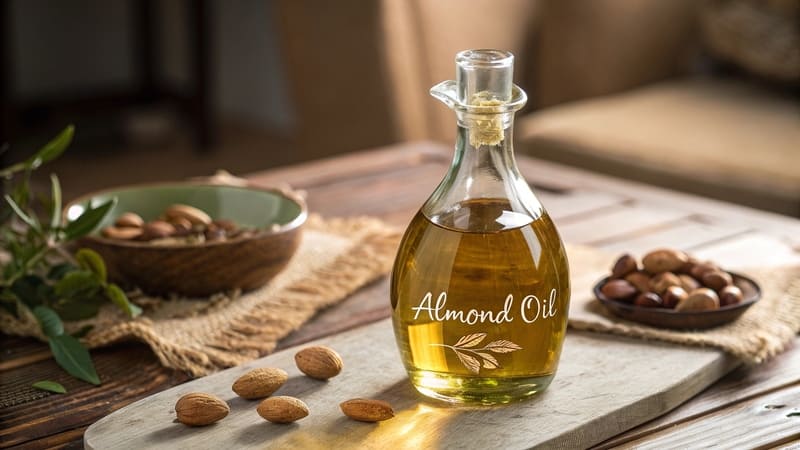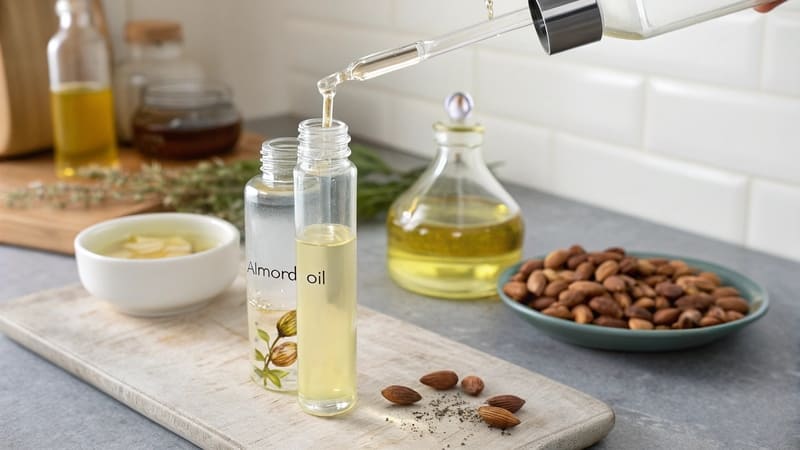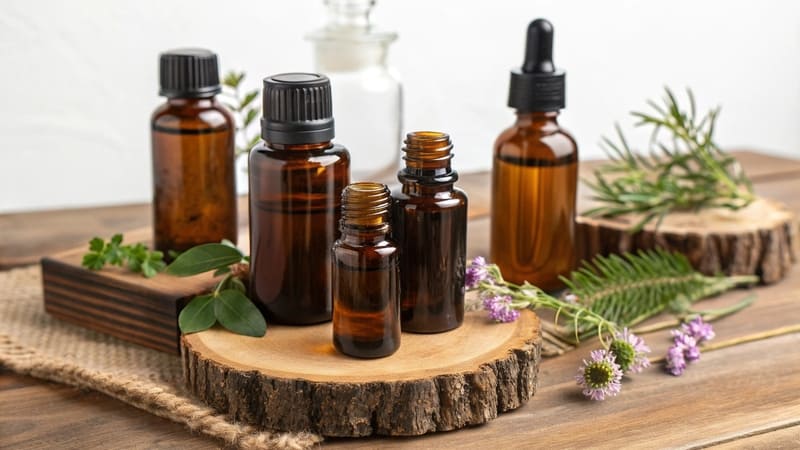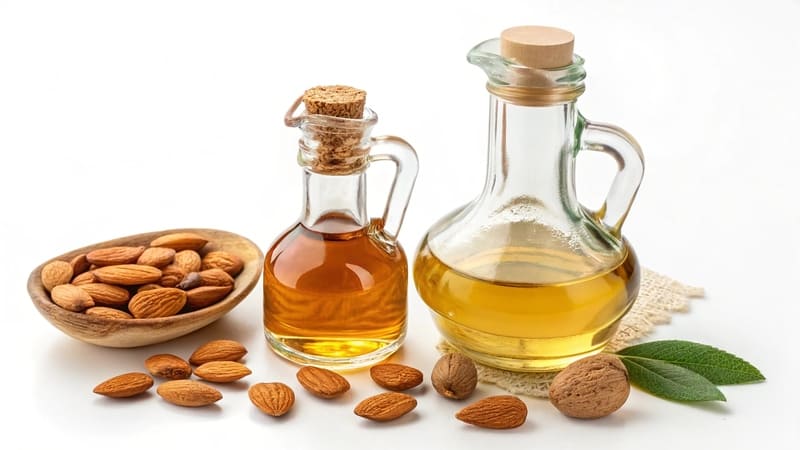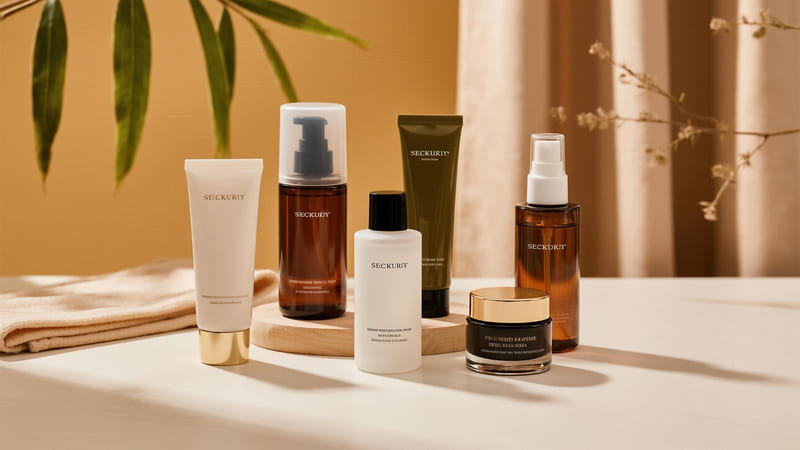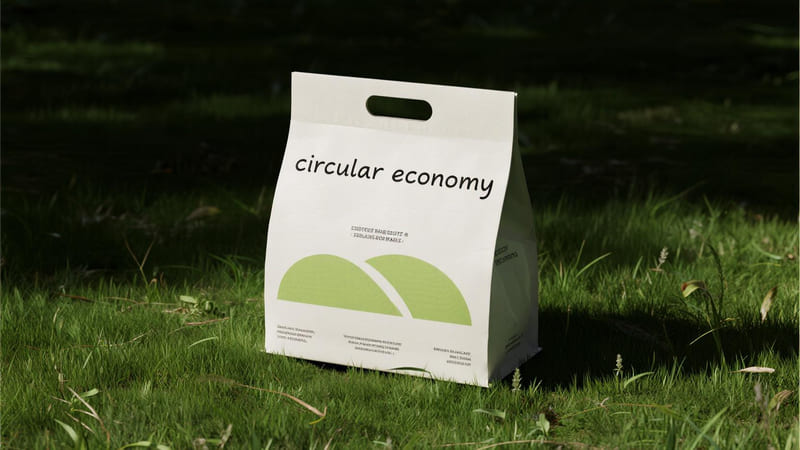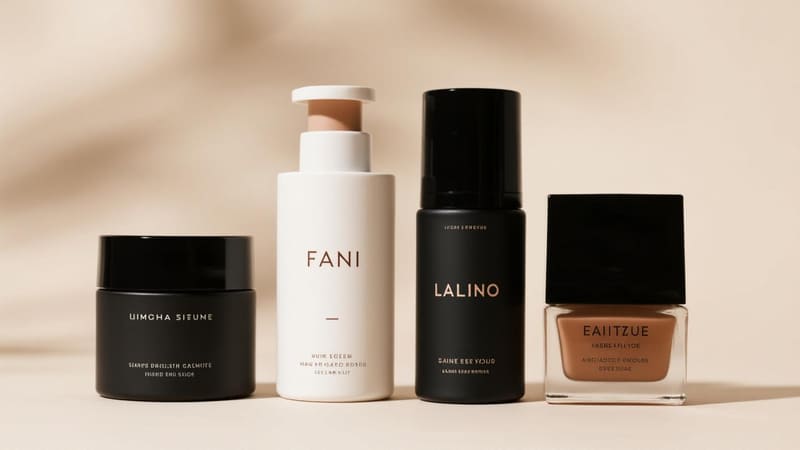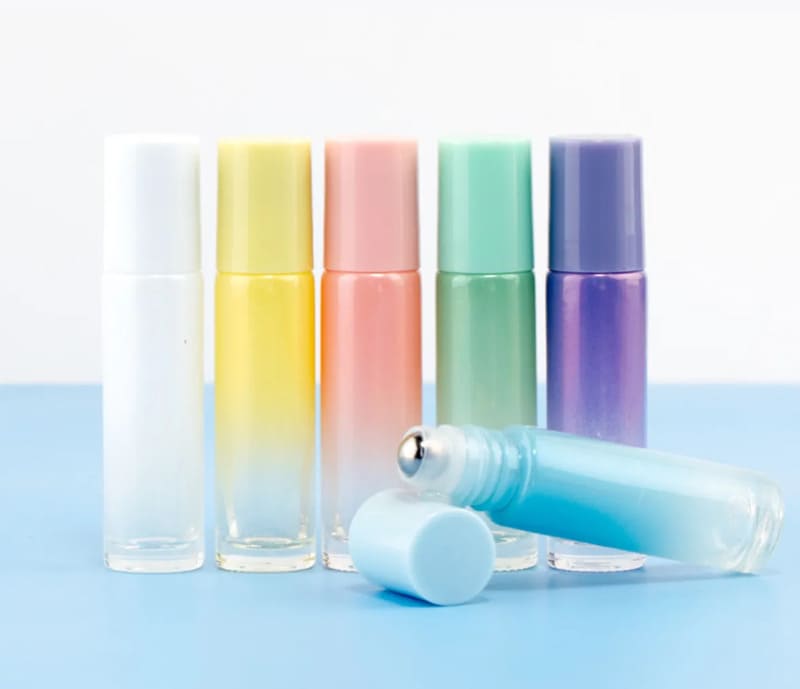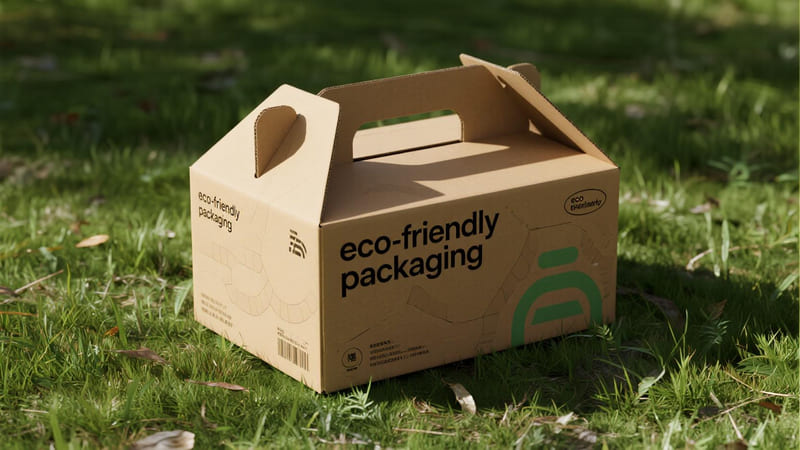You’ve probably noticed almond oil, especially high-quality versions, is often sold in glass bottles. This isn’t just a random choice; there are good reasons behind it. Plastic might seem cheaper, but it’s not always best for preserving oils.
Almond oil often comes in glass bottles because glass is inert, preventing chemical leaching into the oil. It also offers superior protection against oxygen and moisture, helping to maintain the oil’s quality, prevent rancidity, and extend its shelf life, especially when dark-colored glass is used to block UV light.
The choice of packaging for natural oils like almond oil is crucial for maintaining their delicate properties. As a packaging manufacturer with ShineTop for over 20 years, I’ve learned a lot about why certain materials are preferred for specific products. Let’s explore why glass is a top choice for almond oil.
Can I Store Almond Oil in a Plastic Bottle?
Glass bottles can be heavier and more fragile than plastic. You might wonder if transferring your almond oil to a more convenient plastic container is okay for everyday use or travel.
Yes, you can store almond oil in a plastic bottle for short periods, especially if it’s a high-quality, food-grade plastic like PET. However, for long-term storage, glass is generally preferred to prevent potential leaching from the plastic and to better protect the oil from degradation.
While glass is the ideal long-term storage solution, plastic can be acceptable under certain conditions, particularly for convenience.
Considerations for Storing Almond Oil in Plastic:
-
Type of Plastic:
- Good Choices: Use high-density polyethylene (HDPE) or polyethylene terephthalate (PET/PETE) plastics. These are generally considered safer for food and oil storage and are less likely to leach chemicals. Look for food-grade symbols.
- Avoid: Plastics like PVC (polyvinyl chloride) or those containing BPA (bisphenol A) are not recommended, as they have a higher risk of chemical leaching.
-
Duration of Storage:
- Short-Term: If you’re decanting a small amount for travel or immediate use (a few days to a couple of weeks), a good quality plastic bottle is usually fine.
- Long-Term: For storing almond oil for months, glass remains the superior option to maintain its purity and prevent any potential interaction with the plastic.
-
Storage Conditions:
- Regardless of the container, store almond oil in a cool, dark place away from direct sunlight and heat. This applies to both glass and plastic bottles.
- Ensure the plastic bottle has a tight-fitting cap to minimize oxygen exposure.
-
Quality of Oil:
- If you have a very high-quality, cold-pressed, unrefined almond oil, you’ll want to be extra careful to preserve its delicate compounds. Sticking with glass is best for these premium oils.
Here’s a quick comparison for almond oil storage:
| Feature | Glass Bottle | High-Quality Plastic Bottle (e.g., PET) |
|---|---|---|
| Chemical Inertness | Excellent (no leaching) | Good (low risk of leaching) |
| Oxygen Barrier | Excellent | Good to Fair (can be permeable over time) |
| UV Protection | Excellent (if dark colored) | Poor (unless specifically UV treated) |
| Durability | Breakable | More durable, less prone to breakage |
| Weight | Heavier | Lighter |
| Long-Term Storage | Ideal | Acceptable for short periods |
Anna, a cosmetics manufacturer I work with in Thailand, uses almond oil in some of her natural formulations. For the bulk oil she receives from suppliers, it’s always in large glass or food-grade metal containers. When she decants it for her production line, she uses glass or stainless steel. This attention to detail helps maintain the quality of her final products.
Why Are Essential Oils in Glass Bottles?
You’ll almost never see pure essential oils sold in plastic bottles. This strict adherence to glass packaging isn’t accidental; it’s crucial for the integrity of these potent substances.
Essential oils are packaged in glass bottles, typically amber or cobalt blue, because they are highly concentrated and can degrade or react with plastic, causing the plastic to break down and potentially leach harmful chemicals into the oil. Dark glass also protects them from UV light degradation.
Essential oils are much more concentrated and volatile than carrier oils like almond oil. Their chemical composition makes them particularly unsuitable for most plastic containers.
Reasons for Glass Packaging for Essential Oils:
-
Chemical Reactivity:
- Essential oils contain potent aromatic compounds (terpenes, phenols, esters, etc.) that can act as solvents.
- These compounds can break down the structure of many plastics, causing the plastic to warp, melt, or leach chemicals into the essential oil. This contaminates the oil and can render it unsafe or ineffective.
-
Purity Preservation:
- Glass is inert and non-porous. It doesn’t react with the essential oils, ensuring their purity and therapeutic properties are maintained.
-
Protection from UV Light:
- Essential oils are sensitive to degradation from ultraviolet (UV) light. Exposure can alter their chemical composition and reduce their potency.
- Dark-colored glass, such as amber, cobalt blue, or sometimes green, effectively blocks out harmful UV rays, extending the shelf life of the oils.
-
Preventing Oxidation:
- While glass itself doesn’t prevent oxidation more than an airtight plastic seal, the overall integrity and non-reactivity of glass help maintain a stable environment for the oil, which, combined with a good seal, minimizes oxygen exposure.
-
Maintaining Aroma:
- Plastic can sometimes absorb the aroma of essential oils or allow the volatile aromatic compounds to escape over time. Glass better contains the fragrance.
Consider the difference:
| Feature | Essential Oils | Carrier Oils (like Almond Oil) |
|---|---|---|
| Concentration | Highly concentrated | Less concentrated, more stable |
| Volatility | Highly volatile | Less volatile |
| Reactivity | Can be highly reactive with many materials | Generally less reactive |
| Primary Concern | Chemical interaction with packaging, UV degradation | Oxidation, UV degradation, some leaching risk (plastic) |
| Ideal Packaging | Dark Glass (Amber, Cobalt Blue) | Dark Glass (preferred), high-quality PET (short-term) |
Mohammed, my client in Iraq, sometimes includes small vials of essential oil blends in his custom gift sets. He always insists on dark amber glass vials with secure orifice reducers and caps, sourced through us at ShineTop, to ensure the quality and safety of these potent additions.
What are the Disadvantages of Using Almond Oil?
While almond oil is popular and offers many benefits, it’s not without potential downsides. Understanding these can help users make informed choices and use it safely.
Disadvantages of using almond oil can include potential allergic reactions (especially for those with nut allergies), a greasy feel for some skin types, comedogenicity (pore-clogging) for acne-prone individuals, and a relatively shorter shelf life if not stored properly. It can also be more expensive than some other carrier oils.
Almond oil is generally well-tolerated, but like any natural product, it can have some drawbacks for certain individuals or uses.
Potential Disadvantages:
-
Allergic Reactions:
- This is the most significant concern. Individuals with tree nut allergies (specifically almond allergies) should avoid almond oil completely, as it can trigger allergic reactions ranging from skin irritation to more severe systemic responses.
- Even those without known nut allergies can sometimes develop skin sensitivity or contact dermatitis. A patch test is always recommended before widespread use.
-
Greasy Feel:
- Almond oil is moderately rich. While many find it absorbs well, those with very oily skin might find it leaves a greasy residue if too much is applied.
-
Comedogenicity (Pore-Clogging):
- Almond oil has a moderate comedogenic rating (often listed as 2 out of 5). This means it has a possibility of clogging pores for some individuals, potentially leading to breakouts, especially if they have acne-prone skin.
-
Shelf Life and Rancidity:
- Like all vegetable oils, almond oil can go rancid over time, especially if exposed to heat, light, and air. Rancid oil loses its beneficial properties and can even be harmful to the skin. Proper storage (cool, dark place, tightly sealed) is crucial. Its shelf life is typically 6-12 months once opened, sometimes longer if stored perfectly.
-
Cost:
- High-quality, cold-pressed sweet almond oil can be more expensive than some other common carrier oils like sunflower or grapeseed oil.
-
Not Suitable for All Cooking:
- While edible sweet almond oil can be used in food, unrefined almond oil has a low smoke point, making it unsuitable for high-heat cooking. Refined almond oil has a higher smoke point but may have fewer nutrients.
It’s important to distinguish between sweet almond oil (typically used in skincare and as a carrier oil) and bitter almond oil (which contains toxic compounds and should only be used in very specific, diluted forms by professionals, if at all, for aromatherapy – it’s not typically used in skincare). The disadvantages listed above primarily refer to sweet almond oil.
Does Almond Oil Need to Be in a Dark Bottle?
You’ve seen that glass is preferred for almond oil, but does the color of the glass really matter? Is a clear glass bottle just as good as an amber or green one?
Yes, almond oil benefits significantly from being stored in a dark bottle (e.g., amber, cobalt blue, or dark green glass). Dark-colored glass helps to block UV light, which can accelerate the degradation and rancidity of the oil, thereby preserving its quality and extending its shelf life.
The color of the bottle plays a crucial role in protecting almond oil from one of its main enemies: light.
Why Dark Bottles Are Important for Almond Oil:
-
UV Light Protection:
- Ultraviolet (UV) radiation from sunlight or even some artificial lighting can trigger oxidative processes in oils. Oxidation leads to the breakdown of fatty acids and the formation of free radicals, causing the oil to become rancid.
- Rancid oil not only loses its beneficial properties (vitamins, antioxidants) but can also develop an unpleasant odor and taste, and may even be irritating to the skin.
-
Preserving Nutrient Content:
- Almond oil contains beneficial components like Vitamin E, monounsaturated fats, and other antioxidants. Light exposure can degrade these sensitive nutrients over time. A dark bottle helps to shield them.
-
Extending Shelf Life:
- By minimizing light-induced degradation, dark bottles help to prolong the freshness and usability of the almond oil. This is especially important for unrefined, cold-pressed oils that are less processed and retain more of their natural compounds.
-
Maintaining Quality:
- The overall quality, including aroma, color, and efficacy of the almond oil, is better maintained when protected from light.
What if your almond oil comes in a clear bottle?
If you purchase almond oil in a clear glass or plastic bottle, it’s best to:
- Store it in a dark cupboard or pantry, away from any light sources.
- Consider transferring it to a dark glass bottle if you have one available for long-term storage.
- If the clear bottle is inside an outer protective box, keep it in the box until use.
At ShineTop, when we supply glass bottles for oils, we always offer dark amber or cobalt blue options as standard for clients who need to protect light-sensitive contents. This is a common request for natural oils and serums.
Conclusion
Almond oil is often packaged in glass, particularly dark-colored glass, to protect its quality by preventing chemical leaching, oxidation, and UV light degradation. While short-term storage in quality plastic is possible, glass remains superior for preserving the integrity and extending the shelf life of this beneficial oil.

